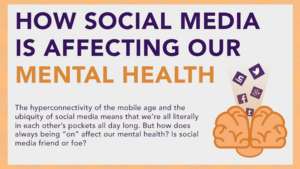In recent years, social media has evolved from a mere platform for social interaction to a powerful tool for advocating mental health awareness. As we step into 2024, the intersection of social media and mental health has never been more crucial. This article explores the evolving role of social media in mental health awareness, the latest trends shaping this field, and the challenges that still persist.
The Evolution of Social Media and Mental Health Awareness
Social media platforms have become central to how people communicate, share information, and seek support. Initially used for personal networking, these platforms now play a significant role in raising awareness about mental health issues. They provide a space for individuals to share their experiences, access resources, and engage in conversations about mental well-being.
Early Beginnings: From Personal Sharing to Public Discourse
In the early 2010s, social media began to see an increase in discussions about mental health, often driven by individuals sharing personal stories. Platforms like Facebook and Twitter allowed users to connect with others who had similar experiences, fostering a sense of community and understanding. As awareness grew, mental health organizations began to leverage social media to reach broader audiences, using it as a tool for education and advocacy.
Trends Shaping Mental Health Awareness in 2024
1. Increased Use of Short-Form Videos
Short-form video content, popularized by platforms like TikTok and Instagram Reels, has become a key medium for mental health awareness. These videos offer quick, digestible insights into mental health topics, coping strategies, and personal stories. They are particularly effective at reaching younger audiences, who are more likely to engage with brief, visually appealing content.
2. The Rise of Mental Health Influencers
Mental health influencers, individuals who use their platform to share their own mental health journeys and provide support to others, have gained significant traction. These influencers often collaborate with mental health professionals to offer evidence-based advice and reduce stigma. Their authentic content resonates with followers, creating a more relatable and accessible approach to mental health.
3. Integration of Mental Health Tools and Resources
Social media platforms are increasingly integrating mental health tools and resources directly into their interfaces. For example, Instagram and Facebook have introduced features that allow users to connect with mental health resources and support services. These integrations aim to provide immediate help and promote mental well-being within the social media environment.
4. Data Privacy and Ethical Considerations
As social media becomes a more prominent tool for mental health advocacy, concerns about data privacy and ethical considerations are growing. Users share sensitive information on these platforms, raising questions about how this data is used and protected. Ensuring that mental health content is handled with respect and confidentiality is crucial for maintaining trust and effectiveness.
Challenges in Using Social Media for Mental Health Awareness
1. Misinformation and Unverified Content
One of the significant challenges in using social media for mental health awareness is the spread of misinformation. With the rise of user-generated content, unverified or incorrect information can easily be shared, leading to potential harm. It is essential for both influencers and organizations to ensure that the content they share is accurate and evidence-based.
2. Digital Burnout
The constant exposure to mental health content on social media can lead to digital burnout, where individuals feel overwhelmed or exhausted by the amount of information they encounter. This can affect their overall well-being and make it harder for them to engage positively with mental health resources.
3. Stigma and Negative Responses
Despite progress, stigma around mental health issues remains prevalent. Individuals who discuss their mental health struggles on social media may face negative responses or judgment, which can discourage open conversation and reduce the effectiveness of mental health advocacy efforts.
4. Algorithmic Impact on Mental Health
Social media algorithms often prioritize content that generates high engagement, which can sometimes lead to the promotion of sensational or controversial topics. This can create a distorted view of mental health issues and potentially contribute to anxiety or stress among users. Balancing algorithmic goals with the promotion of healthy and supportive content is a challenge that platforms must address.
Moving Forward: Strategies for Effective Mental Health Advocacy
1. Promoting Accurate and Evidence-Based Information
To combat misinformation, it is crucial to promote content that is based on scientific research and expert advice. Collaborations between mental health professionals and content creators can ensure that the information shared is both accurate and helpful.
2. Encouraging Positive Engagement
Fostering positive engagement on social media involves creating supportive communities where individuals feel safe sharing their experiences. Encouraging respectful dialogue and providing resources for mental health support can enhance the effectiveness of advocacy efforts.
3. Addressing Privacy Concerns
Maintaining user privacy is essential for building trust and ensuring that individuals feel comfortable seeking support. Social media platforms must implement robust data protection measures and be transparent about how user information is used.
4. Balancing Content and Well-Being
Users should be encouraged to balance their social media consumption with other activities that support their mental well-being. This can include setting boundaries around social media use and engaging in offline activities that promote relaxation and mental health.
Conclusion
As we navigate 2024, social media continues to play a pivotal role in mental health awareness. While it offers unprecedented opportunities for connection and support, it also presents significant challenges that need to be addressed. By focusing on accurate information, positive engagement, privacy, and user well-being, social media can be a powerful ally in the ongoing effort to promote mental health and support individuals in their journeys toward well-being.




